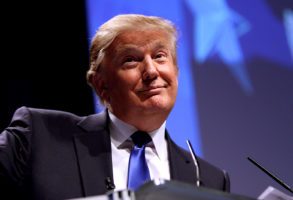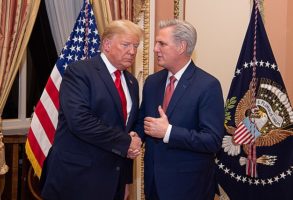
Published August 10, 2017
Editor’s Note: In a series of columns, Pascal-Emmanuel Gobry, a Paris-based conservative and Fellow at the Ethics and Public Policy Center, will write on an alarming trend, which he calls the Francification of America.
France and America are countries linked at birth and have always seen in each other funhouse-mirror visions of the other, and they have used the other to try to understand themselves. Writers such as Alexis de Tocqueville in the 19th century and Jean-Jacques Servan-Schreiber in the 20th wanted France to be more like America; today, Gobry argues, America is turning into France, and in the wrong ways.
To say that Donald Trump is a kind of American version of Jean-Marie and Marine Le Pen, the French populist leaders, has become a bit of a cliché. What is more interesting is what it means for where America is headed.
But first, let us rehearse the case for Trump being the American Le Pen. We can check off the list. There is the rhetoric: the over-the-top nationalism (Trump calls for “America First,” Marine Le Pen’s consigliere wants to rebrand her National Front party as “The Patriots”), the xenophobia, as distinguished from sensible immigration restrictionism, complete with not-so-naked ethnic appeals and scapegoating of minority groups and “us-versus-them” populist rhetoric. There are the outrageous comments on hot-button issues that allow you (sometimes legitimately, but sometimes not) to paint yourself as a victim of PC thought police and elite media propaganda. Then there is the agenda (at least the agenda of those who would want Trumpism to have an agenda, such as Stephen Bannon and Stephen Miller, as opposed to the White House’s actually existing agenda, which is all over the place), which departs from traditional economic conservatism in its embrace of corporatism and opposition to free trade. And, of course, there is the bizarre fascination with Vladimir Putin.
American politics used to be distinguished precisely by its absence of an American Le Pen. Now not only do we have one, he won a presidential election, which means he might reshape America’s political coalitions in his image. Perhaps not. Perhaps Trump will be disgraced, even impeached, and Republican elites will draw the conclusion that we can all go back to reheated Reaganism forever. Or perhaps Trump merely foreshadows a “successful Trump,” someone with similar politics and the talent to turn that political capital into an agenda and remake his party.
A Trumpified American politics would introduce something that has long existed in Europe but rarely in the United States: class-based parties. This is not solely due to Trump: The major American political parties have slowly been evolving away from being loose coalitions of competing interests to being ideologically rigid entities, this phenomenon being both a cause and a consequence of our ever-increasing partisan polarization. Since all humans have a tendency to rationalize pursuing their interests on the basis of some high-minded belief, ideological polarization was fertile ground for class-based polarization.
Yes, America’s racial divisions mean it’s hard to imagine working-class African Americans voting en masse for Trump in the way white American working-class voters have just because he has a pro-working-class agenda. But even on this score, it should be noted that Trump outperformed Mitt Romney among minorities. Presumably a Trump 2.0 figure who made a merit- and assimilation-based argument for immigration restrictionism and refrained from calling Mexican judges unqualified and referring to African Americans as “the blacks,” while keeping the anti-corporate, anti-trade, pro-worker rhetoric, could win even more minority votes — far from a majority of them, but enough to deny a Democratic candidate or party a majority.
Regardless — the important point is that while America’s Democratic party retains a large share of economically underprivileged voters, it remains functionally an intelligentsia party. Its agenda is not driven by its minority members, who “have nowhere else to go,” it is driven by its (largely white) upper-middle-class cohort. After all, its support for immigration amnesty and low-skilled immigration is much more comfortably in the interests of upper-middle-class urban voters than in the interests (certainly) of middle and working-class African Americans and (arguably) native middle and working-class Hispanic-Americans. While some Democrats flirt with populist measures such as a $15 federal minimum wage or single-payer health care, it seems to be much more preoccupied with culture-war issues that appeal to the intelligentsia.
It should be noted that, up until the emergence of Emmanuel Macron’s cross-partisan movement, this is also how France’s Socialist party worked: Having lost its old white working-class constituents to the National Front, it became a party of the educated bureaucratic middle class and “champagne socialist” intelligentsia plus second-generation immigrants who voted for the Left as a way to vote against the Right and got nothing in exchange. (Muslim leaders campaigned for François Hollande as a way to kick out the conservative Nicolas Sarkozy, giving him a crucial leg-up in a close election, and were then outraged when the new Socialist president made same-sex marriage the top of his agenda.)
Meanwhile, the efforts of the éminences grises of Trumpism have been to rebrand the GOP as a “worker’s party.” Because of the general incompetence of the Trump administration, this “rebranding” has not made its way into policy, but the direction is still the same: a bipartisan system that is broken down by class more than geography or ideology or some other criterion. The problem is that class-based politics tend to be very nasty, because they inevitably end up being framed as a zero-sum battle for a fixed pie. Paul must always rob Peter to pay himself. And so fights take on a nearly existential character.
But there is another, deeper problem with the lepénisation of American politics: the loss of the ethos of limited government. Friedrich Hayek, Austrian immigrant to America, famously remarked that America was the only place where one could be both a conservative and a liberal, in the sense of classical liberal. More than economics or even cultural issues per se, the key division between progressivism and conservatism has been between top-down government and bottom-up government. Tragically, politics in France has been a debate about two different kinds of top-down government. A complete lepénisation of American politics would do that here, too. And it would mean the end, not of conservatism, but certainly of the exceptional American style of conservatism, to be replaced by French-style conservatism.
— Pascal-Emmanuel Gobry, a Paris-based writer, is a Fellow at the Ethics and Public Policy Center.








